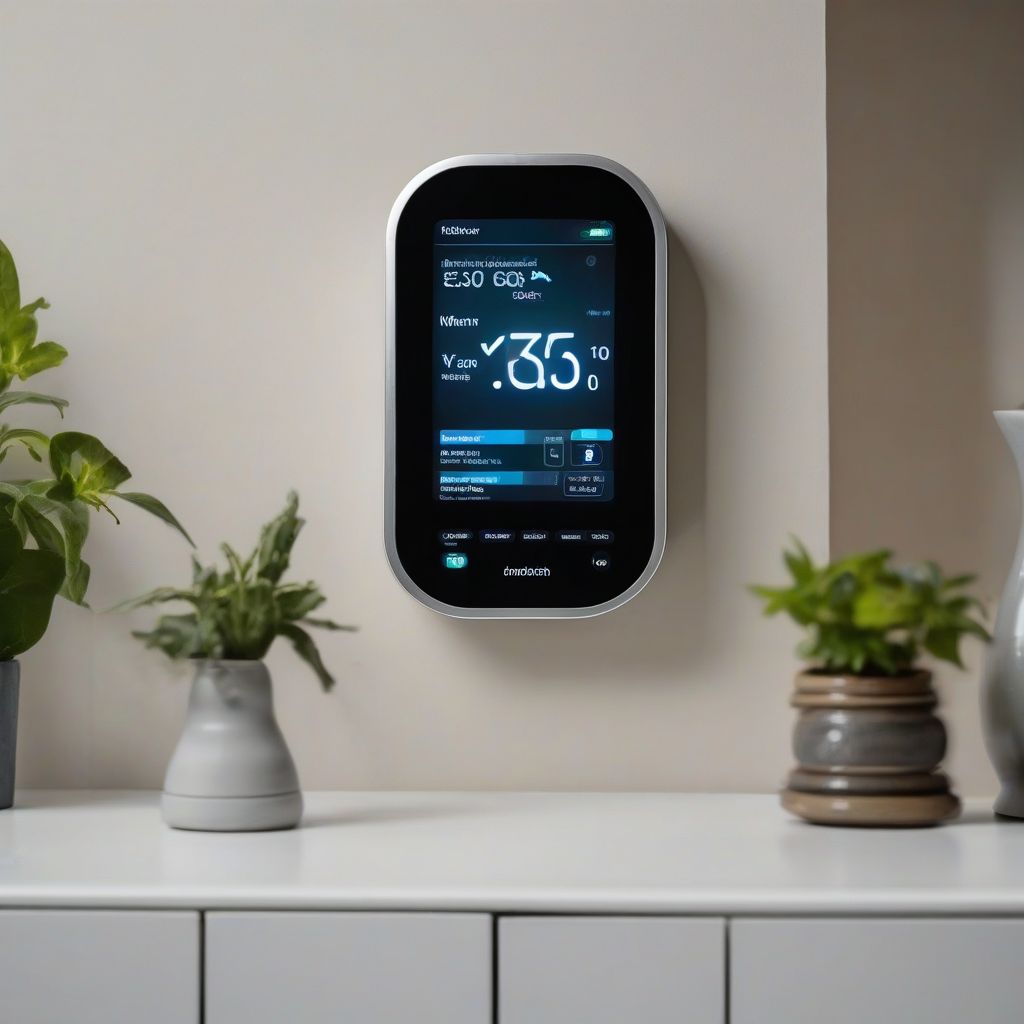Imagine this: you wake up on a chilly winter morning, and your smart thermostat has already adjusted the temperature to a cozy level, ensuring you’re comfortable without wasting energy. As you start your day, your lights turn on automatically, only in the rooms you’re using, thanks to smart sensors. This isn’t a scene from a futuristic movie – this is the reality of smart home technology and its incredible potential to revolutionize energy conservation.
Understanding the Power of Smart Homes for Energy Efficiency
Smart home technology empowers homeowners to manage their energy consumption with unprecedented precision. No longer are we beholden to outdated systems that guzzle energy and inflate bills. Let’s delve into the key components of a smart home and how they contribute to a greener, more sustainable lifestyle:
1. Smart Thermostats: Taking Control of Your Home’s Climate
Did you know that heating and cooling account for nearly half of a home’s energy usage? This is where smart thermostats come in as game-changers. These intelligent devices learn your preferences and schedules, automatically adjusting the temperature for optimal comfort and energy savings.
Here’s how they work:
- Learning Your Habits: Smart thermostats track your daily routines, understanding when you’re home, away, or asleep.
- Remote Control: Adjust your home’s temperature from anywhere using your smartphone, ensuring a comfortable environment without wasting energy.
- Geofencing: These smart devices can detect your location and adjust the temperature accordingly. Imagine your home warming up as you approach, all while saving energy while you’re away.
- Energy Reports: Gain insights into your energy usage patterns and identify areas for improvement with detailed reports.
 Smart Thermostat Energy Saving
Smart Thermostat Energy Saving
2. Smart Lighting: Illuminating Your Home Efficiently
Lighting might seem like a small contributor to energy consumption, but it can quickly add up. Smart lighting solutions offer a brilliant way to reduce waste and enhance ambiance.
The benefits are clear:
- Motion Sensors: Lights automatically switch on when you enter a room and turn off when it’s empty, eliminating the energy drain of forgotten lights.
- Dimming Capabilities: Adjust the brightness of your lights to suit the mood and save energy.
- Smart Bulbs: LED bulbs are renowned for their energy efficiency, and smart bulbs take it a step further by allowing you to control them remotely and set schedules.
3. Smart Appliances: Energy Efficiency at Your Fingertips
From refrigerators to washing machines, our homes are filled with appliances that consume energy. Smart appliances are designed with energy conservation in mind, offering features that make a significant difference:
- Optimized Performance: Smart appliances can adjust their energy consumption based on usage patterns and load size, maximizing efficiency.
- Remote Monitoring: Keep tabs on your appliance usage and identify potential energy-saving opportunities.
- Smart Features: Features like delayed start for washing machines or vacation mode for refrigerators optimize energy consumption based on your needs.
[amazon bestseller=”smart plug”]
4. Smart Power Strips: Eliminating Phantom Energy Loss
Even when devices are turned off, many continue to draw power, a sneaky energy drain known as “phantom loads.” Smart power strips combat this by cutting off power to devices when they’re not in use, resulting in substantial energy savings.
5. Smart Home Energy Monitors: Knowledge is Power
Understanding your energy consumption patterns is the first step toward making meaningful changes. Smart home energy monitors provide real-time insights into your energy usage, allowing you to:
- Identify Energy Hogs: Pinpoint appliances or devices that are consuming the most energy and adjust your usage accordingly.
- Track Your Progress: Monitor your energy-saving efforts and stay motivated to maintain sustainable habits.
The Far-Reaching Benefits of Smart Home Energy Conservation
Embracing smart home technology isn’t just good for your wallet; it’s an investment in a more sustainable future:
- Reduced Carbon Footprint: By consuming less energy, we reduce greenhouse gas emissions, combating climate change.
- Lower Energy Bills: Smart home technology empowers you to take control of your energy consumption, leading to significant savings on your monthly bills.
- Increased Home Value: Energy-efficient homes are in high demand, adding value to your property.
- Enhanced Comfort and Convenience: Smart home technology simplifies daily tasks and creates a more comfortable living environment.
The Future of Energy Conservation is Smart
As technology continues to evolve, so too will the energy-saving potential of smart homes. The future holds exciting advancements, including:
- Artificial Intelligence: AI-powered systems will anticipate our needs and optimize energy consumption with even greater precision.
- Renewable Energy Integration: Smart homes will seamlessly integrate with solar panels and other renewable energy sources, maximizing energy efficiency and reducing our reliance on fossil fuels.
- Smart Grid Connectivity: Smart homes will communicate with the power grid, allowing for more efficient energy distribution and reduced strain during peak demand.
Embrace the Smart Home Revolution Today
The journey to a more sustainable future begins at home. By embracing smart home technology, we can transform the way we consume energy, reducing our environmental impact while enjoying the benefits of a more efficient and convenient lifestyle.
Start small by investing in a smart thermostat or smart bulbs, and gradually build your smart home ecosystem. The planet (and your wallet) will thank you.
